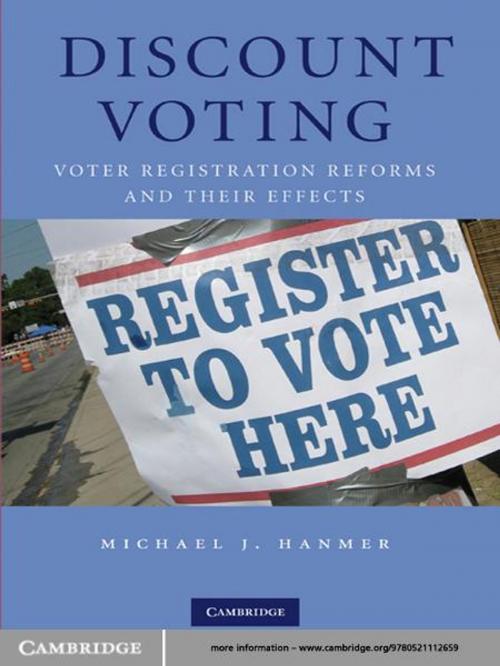Discount Voting
Voter Registration Reforms and their Effects
Nonfiction, Social & Cultural Studies, Political Science, Government| Author: | Michael J. Hanmer | ISBN: | 9780511699221 |
| Publisher: | Cambridge University Press | Publication: | August 17, 2009 |
| Imprint: | Cambridge University Press | Language: | English |
| Author: | Michael J. Hanmer |
| ISBN: | 9780511699221 |
| Publisher: | Cambridge University Press |
| Publication: | August 17, 2009 |
| Imprint: | Cambridge University Press |
| Language: | English |
In the US, there is wide variation from state to state in the institutional arrangements - for example, registration laws - that structure the environment in which citizens decide whether to vote and parties decide whom to mobilize. This has important consequences for who gets elected and the policies they enact. In this book Michael Hanmer argues that to understand how these institutional arrangements affect outcomes, it is necessary to consider the interactions between social and political context and these laws. He tests this theory by examining how the factors that influence the adoption of a set of registration laws affect turnout, the composition of the electorate, and party strategies. His multi-method research design demonstrates that the effect of registration laws is not as profound as either reformers would hope or previous studies suggest, especially when reform is a response to federal legislation. He concludes by arguing for a shift in the approach to increasing turnout.
In the US, there is wide variation from state to state in the institutional arrangements - for example, registration laws - that structure the environment in which citizens decide whether to vote and parties decide whom to mobilize. This has important consequences for who gets elected and the policies they enact. In this book Michael Hanmer argues that to understand how these institutional arrangements affect outcomes, it is necessary to consider the interactions between social and political context and these laws. He tests this theory by examining how the factors that influence the adoption of a set of registration laws affect turnout, the composition of the electorate, and party strategies. His multi-method research design demonstrates that the effect of registration laws is not as profound as either reformers would hope or previous studies suggest, especially when reform is a response to federal legislation. He concludes by arguing for a shift in the approach to increasing turnout.















